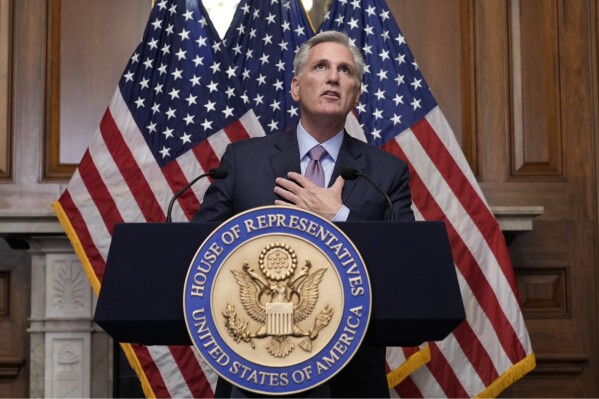GOP Rep. Kevin McCarthy of California is resigning, 2 months after his ouster as House speaker
LOS ANGELES (AP) — Two months after his historic ouster as House speaker, Republican Rep. Kevin McCarthy of California announced on Wednesday that he is resigning from his congressional seat and will leave by the end of the year.
His announcement capped a stunning end for the one-time deli counter owner from Bakersfield, who ascended through state and national politics to become second in line to the presidency before a contingent of hard-right conservatives engineered his removal in October.
McCarthy is the only speaker in history to be voted out of the job.
“No matter the odds, or personal cost, we did the right thing,” McCarthy wrote in an op-ed in the Wall Street Journal, announcing his decision.
Kevin McCarthy resigns
His resignation comes just two months after he was removed as House Speaker.
- McCarthy’s historic ouster saw his Republican majority fall to chaos during a time of simmering uncertainty at home and abroad. Here’s how it happened.
- While his colleagues scrambled to find a new Speaker, he positioned himself as a de facto Republican leader even though they toppled him from power.
- For now, new Speaker Mike Johnson holds favor with the ultra-conservative wing of his party. But can he unite House Republicans where others failed?
“It is in this spirit that I have decided to depart the House at the end of this year to serve America in new ways,” he wrote.
An announcement on McCarthy’s future had been expected, days before the filing deadline to seek reelection. But his decision ricocheted across Capitol Hill, where his departure will leave the already paper-thin House GOP majority even tighter, with just a few seats to spare.
It comes during a wave of retirements in the House, which has been riven by Republican infighting, and the rare expulsion last week of indicted GOP Rep. George Santos of New York, dashing hopes for major accomplishments and leaving the majority straining to conduct the basic business of governing.
McCarthy had brought the Republicans into the majority but found it was much more difficult to lead the GOP’s hard-edged factions.
His toppling from the chamber’s top post was fueled by grievances from his party’s hard-right flank, including over his decision to work with Democrats to keep the federal government open rather than risk a shutdown.
 McCarthy was ditched and Santos expelled. The House is making history, but not as the GOP envisioned
McCarthy was ditched and Santos expelled. The House is making history, but not as the GOP envisioned
 Kevin McCarthy was an early architect of the Republican majority that became his downfall
Kevin McCarthy was an early architect of the Republican majority that became his downfall
 Kevin McCarthy’s ouster as House speaker could cost the GOP its best fundraiser heading into 2024
Kevin McCarthy’s ouster as House speaker could cost the GOP its best fundraiser heading into 2024
McCarthy, 58, arrived in the House in January 2007 after a stint in the California Assembly, where he served as minority leader. In Congress, he maneuvered through his party’s hierarchy — serving as majority whip and Republican leader along the way — before being elected speaker in January 2023.
The dayslong floor fight that preceded his elevation to the House’s top job foreshadowed a stormy tenure, at a time when former President Donald Trump remained the de facto leader of the party and deep divisions within the GOP raised serious questions about the party’s ability to govern.
It took a record 15 votes over four days for McCarthy to line up the support he needed to win the post he had long coveted, finally prevailing on a 216-212 vote with Democrats backing leader Hakeem Jeffries and six Republican holdouts voting present. Not since the Civil War era has a speaker’s vote dragged through so many rounds of counting.
McCarthy emerged from the fight weakened, especially considering Republicans held only a fragile margin in the chamber after a predicted “red wave” failed to materialize in the 2022 elections.
Once installed as speaker, his well-known savvy for fundraising and political glad-handing appeared ill-suited for corralling his party’s disputatious hard-right faction. And deals he cut to become speaker — including a rules change that allowed any single lawmaker to file a motion to remove him — left him vulnerable.
When he became speaker, “he faced new challenges that required a different skill set,” said Claremont McKenna College political scientist Jack Pitney, a one-time domestic policy analyst for House Republicans. And “the deals he made to become speaker made it almost impossible for him to succeed as speaker.”
McCarthy, the son of a firefighter and a homemaker, has long depicted himself as an unflagging battler. He is fond of quoting his father, who told him, “It’s not how you start, it’s how you finish.”
McCarthy hails from Bakersfield, a Republican-leaning area in Central California where oil derricks blanket hillsides and country music fans pack into Buck Owens’ Crystal Palace hall. Far from the Southern California beaches and tony San Francisco restaurants, farming and oil pumping shape the economy.
Disclaimer: The copyright of this article belongs to the original author. Reposting this article is solely for the purpose of information dissemination and does not constitute any investment advice. If there is any infringement, please contact us immediately. We will make corrections or deletions as necessary. Thank you.





